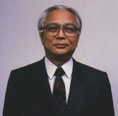University Reform in the Information Age: From Selective Education To Learning Support
Shumpei KUMON (Executive Director and Professor, GLOCOM)
 There is much discussion about university reform currently taking place in Japan. However, little attention has been paid to changes in the nature of education itself in the information age. There is much discussion about university reform currently taking place in Japan. However, little attention has been paid to changes in the nature of education itself in the information age.
Today we are witnessing a new trend towards information society, namely, "informatization," along with the existing industrialization trend. While industrialization means constant upgrading of people's economic power (power of transaction in social relations), "informatization" means constant upgrading of intellectual power (power of persuasion in social relations). People are willing to spend more energy in seeking and sharing information and knowledge.
In such a world, authoritarian intellectual class relations of the past are being shaken from their foundations. Demarcation lines are blurring between teachers and students, between doctors and patients, or more generally, between professionals and amateurs. It has long been known that in computing, young assistant professors are better than old professors, but students are even better than young professors, and some high school kids are probably the best in handling most advanced knowledge and techniques about computers. Under those circumstances, intellectual authoritarianism, at least in the traditional sense, can no longer hold up. Similarly, it is becoming impossible for professional doctors to control information about the illnesses and treatments of their patients in an authoritarian way. Patients not only demand "informed consent," but also could sue hospitals and doctors for huge compensation against malpractice or concealed information. Insurance premiums to cover such litigation likely will become too high for hospitals to be able to pay. In other words, the existing business model for hospitals is being shaken and may be collapsing.
It might be predicted that a similar development will be seen in the field of education. Actually, there seems to have been such a force working to turn university education in that direction for some time now. For example, I myself had a difficult time responding to my students' insistence that acquiring degrees was their "right" when I was teaching at a graduate school in Canada thirty some years ago. I also remember that a notable American economist who visited that school at that time and lectured that primary school pupils should not criticize their teachers or participate in decisions on school affairs was unable to answer an audience member's (a female graduate student's) challenge on this point.
In this context, I recall that I was impressed by reading the text of an inaugural speech by former Harvard University president Neil Rudenstine, who expressed his determination to turn his university around, ahead of other schools, to become a learning support organization for students, as even Harvard could not survive by sticking to the old model for higher education in which professors teach students unilaterally and authoritatively.
It is certain that universities cannot remain institutions to select people for the sake of the state or to produce and maintain "school factions" in society. Students interested in learning will no longer come to such institution to study. Universities should become institutions that give students eager to learn by themselves advice as to what and how to learn, and that support them in their learning processes in accordance with individual interests, needs, and abilities. In other words, the education industry, or rather the "learning industry," must become a new service industry where those who are on the demand side can draw the best combinations of information and knowledge for their purposes, instead of being forced by the supply side to accept a particular discipline. Such universities, especially those universities that specialize in adult education, should not impose entrance exams or uniform curricula on students, but rather should accept everyone who wishes to enter and try to assist them in planning and executing their study programs individually.
If broadband Internet services become freely utilized, students can obtain their learning resources not only from their school libraries but from everywhere online. If distance learning programs become widely available students can find the best lectures to attend from all over the world.
Needless to say, the role of "professionals" in the strict sense of the word will remain important, and the need for educating and training those professionals will not vanish in the future. However, their role is not to guide non-professionals but rather to support and collaborate with them. It also may be considered sufficient to have a small number of professionals in each generation, relative to the total population of the same generation. This means that our future education/learning industry may well become double tracks; that is, education for professionals and learning support for non-professionals.
|





